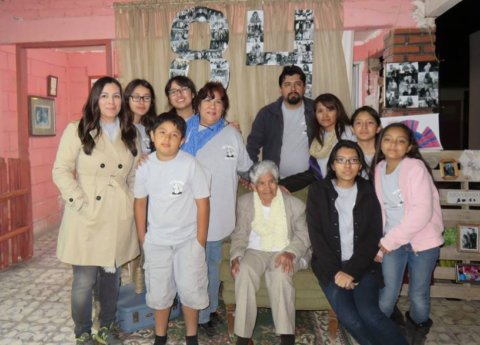My Nana Elvira and Sebastiana: How two generations of Mexican women showed me what it means to lead, by OEH Intern Iliana Gutiérrez
Iliana’s aunt and Nana Elvira
Sebastiana discusses MILPA’s work with Radio Ach’Lequilc’op
Iliana (third from the left) and her family celebrating Nana Elvira’s 84th birthday
Reflecting back on my life growing up, I recognize that I was constantly surrounded by strong women who held my family together. I had my mom, my tías, my grandmas, and even my great-grandmas. Back then I didn’t really appreciate the abundance of female figures in my family. They were just the norm. It wasn’t until two years ago, on a visit to my great-grandmother Nana Elvira, that I realized how the women in my family carry and uplift those around them by acting as leaders for others.
In 2016, after a long hiatus, I went to visit the family ranch in Mexicali, Mexico. It was my Nana Elvira’s 84th birthday, and we had planned a small fiesta to get my family all together again.
My Nana Elvira has always been somewhat of an enigma to me. As a child I would go visit her, do the mandatory greetings, hugs, and kisses, and then I would run off to look for my cousins around the ranch. But I always knew she was there. She was always watching, sitting on her chair and talking to my tías and tíos, as the kids ran around, reprimanding us if we got too rowdy.
As I got older, I learned more about her. I learned about how she had to take charge and raise eight children on her own after her husband left her. I learned that she had to manage acres of land on the ranch when no one else could help. I heard stories of how she was constantly cooking tortillas and frijoles to make sure everyone was fed and happy.
So, as I stood there watching everyone sing Feliz Cumpleaños to her on her 84th birthday, I reflected on all the pieces of her story that I had gathered over the past few years and how despite the many obstacles and difficulties my Nana Elvira grew into a leader of our family who helped to raise generations of strong women who in turn lead their families and communities.
But what most struck me was how my Nana Elvira and other strong women in my life draw upon a power and wisdom that emerges from the unique challenges and experiences that women face in their daily lives. It is this leadership that develops with the support and encouragement of their communities.
In November, I attended a small roundtable event at the UW Information School and One Equal Heart. We listened to the words of Marisela García Reyes, Associate Director of the Center of Indigenous Human Rights (CEDIAC) in Chiapas, and Petul Gutiérrez Cruz, CEDIAC’s coordinator of regional community planning. They shared the qualities of leadership in Tseltal communities, and I was struck by how different that leadership model is from the Western definition.
In Tseltal communities, a leader is someone who…
is an example for the entire community–culturally, socially, and spiritually;
has a strong record of community service;
is willing to share their wisdom and whose advice and counsel is sought out;
can manage their emotions in challenging situations;
is accepting of people; and
works within, or strives to create, a COMMUNITY of leaders
The story of Sebastiana del Carmen Aguilar Moreno from Chilón, Chiapas is a good example of how Tseltal communities develop their leaders.
Sebastian is a 29 year-old Tseltal woman and a lawyer. She was hired by CEDIAC to coordinate MILPA (Indigenous Women for Leadership, Participation, and Action), a collaborative project funded by One Equal Heart donors. With MILPA, Sebastiana’s work is rooted in community. Step by step, the community is helping Sebastiana to build on a solid foundation of trust with a cadre of indigenous women advocates and promoters.Through MILPA’s various activities, in meetings and community assemblies, MILPA promoters and advocates are discovering their voices. By sharing their stories—both painful and courageous, in public spaces, they inspire others to resist remaining silent. And in sharing their stories, Sebastiana found the strength and courage to share her own story.
MILPA recognizes that Tseltal women are already leaders in their communities. What the project focuses on is strengtheningtheir collective leadership within communities as a whole, rather than a single individual as a leader. It is in these spaces where women like Sebastiana and others find strength to become leaders and together amplify their voices to defend their rights.
This is the kind of leadership and the kind of development that One Equal Heart supports in Chiapas, Mexico. By placing collaborative relationships with indigenous women at the center, One Equal Heart, together with partner nonprofit organizations in Mexico, not only advances women’s rights, but also ensures their active participation in the development of their communities in ways that honor and respect their vision and their priorities.Through MILPA, Tseltal women like Sebastiana have the opportunity to train for leadership positions and connect with other women. They are able to challenge cultural norms, represent their communities at assemblies, work to eliminate violence against women, and foster gender equity in the process.
I see my family reflected in Sebastiana and her work with Tseltal women in their actions and strength, I see a community of leaders who care for future generations of children. I see a bonded matriarchy that is empowered by systems that believe in them and tell them they can. As someone who comes from a family of women leaders, strengthening communities of women with all the challenges that we encounter is important to me, especially as the granddaughter of Nana Elvira.



